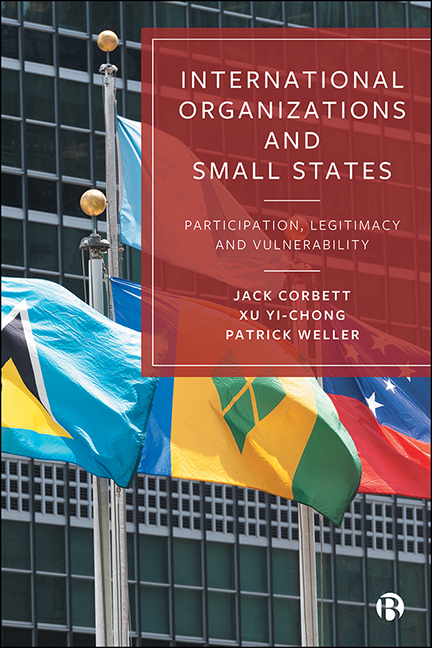3 - Why Do Small States Engage with IOs?
Published online by Cambridge University Press: 13 May 2022
Summary
The long-standing assumption in the IR literature is that small states have very little influence in IOs. Or, if they do appear to have influence, their impact is a chimera that masks the power of larger ‘system influencing’ states who are the ones really determining outcomes. If this is correct, why do small states participate in IOs at all? The creation of a large number of small states in the second half of the 20th century has seen the membership of IOs expand rapidly. The Pacific state of Samoa, for example, which has a resident population of little more than 200,000 people, is a member of 33 IOs (not including numerous regional organizations, sporting, religious, and other social organizations), while Vanuatu, which has a similar population size, is a member of 36: crude but impressive measures of this expansion (Corbett and Connell, 2015: 442). The aim of this chapter is to explain why some SIDS have sought to participate when their limited capacity would appear to favour free-riding or opting out of multilateralism altogether.
The short answer is that small states see their participation in IOs as serving their interests. But to understand this we have to differentiate between different types of small states and the ideas they have about their interests. We distinguish between three common narratives about how SIDS see their participation. At the most basic level, small states participate to secure sovereign recognition of their status as states. That is, participation is a form of conformity that incidentally secures survival (Sharman, 2015, 2017). For some SIDS this is the sum total of their engagement with IOs and their membership of different organizations is tightly bound to those that will maximize this objective at the lowest cost (that is, the UN). This has led to the perception that they get a ‘free ride’ (Olson and Zeckhauser, 1966). A second reason is they participate because they believe it will contribute to their development. These states engage selectively on certain issues and in certain IOs where they believe they are likely to either extract the most resources or gain S&DT for their economies. The majority of SIDS are in this group. The final reason is that SIDS have the greatest stake in the function and continuity of the LIO.
- Type
- Chapter
- Information
- International Organizations and Small StatesParticipation, Legitimacy and Vulnerability, pp. 58 - 84Publisher: Bristol University PressPrint publication year: 2021



